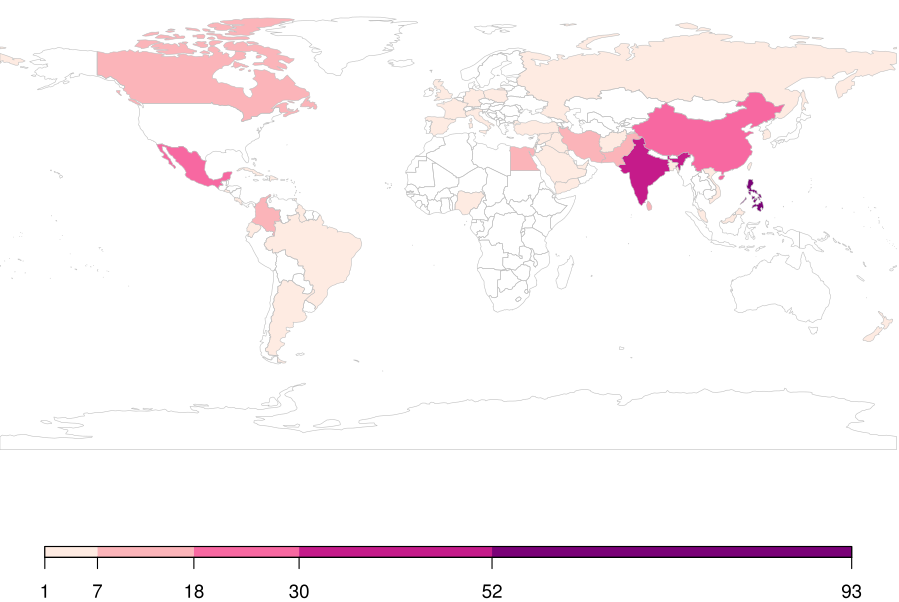Factors Related to International Travel for Transplantation among US-Listed Kidney Transplant Candidates
1School of Nursing, University of Pennsylvania, Philadelphia, PA, 2Department of Surgery in the Division of Transplantation, Johns Hopkins University, Baltimore, MD, 3Department of Epidemiology, University of North Carolina, Chapel Hill, NC, 4M. Louise Fitzpatrick College of Nursing, Villanova University, Villanova, PA
Meeting: 2019 American Transplant Congress
Abstract number: 215
Keywords: Ethics, Kidney transplantation, Risk factors, Waiting lists
Session Information
Session Name: Concurrent Session: Kidney Deceased Donor Allocation II
Session Type: Concurrent Session
Date: Monday, June 3, 2019
Session Time: 2:30pm-4:00pm
 Presentation Time: 3:18pm-3:30pm
Presentation Time: 3:18pm-3:30pm
Location: Ballroom B
*Purpose: The aim of this study was to identify factors associated with international travel for transplantation among US-listed kidney transplant (KT) candidates.
*Methods: Using 2010-2016 data from the Scientific Registry for Transplant Recipients and the Country Health Rankings, we identified 364 adult KT candidates who received a KT abroad and 76,133 candidates who received a deceased donor kidney transplant (DDKT) in the US. Differences in characteristics between candidates who received a DDKT in the US and those who traveled abroad for KT were assessed using the χ2 and Mann-Whitney rank-sum tests. We assessed factors associated with travel for transplantation using adjusted logistic regression.
*Results: Of the 364 adult candidates who traveled outside the US for KT during the study time period, 354 candidates provided data on the country where they underwent transplantation. Candidates listed a total of 46 different countries (see Figure 1). The countries with the higher number of KT of U.S.-listed candidates were the Philippines (n=93), India (n=52), China (n=30), Mexico (n=30), Iran (n=18), Pakistan (n=17), Canada (n=12), and Egypt (n=12). Candidates who traveled abroad for KT had greater odds of being male (aOR: 1.151.461.86), Asian (aOR: 8.8111.5815.21), Hispanic (aOR: 1.271.852.70), college educated (aOR: 1.622.142.81), employed (aOR: 1.131.461.88), privately insured (aOR: 1.241.612.09), and a non-U.S. citizen/non-U.S. resident (aOR: 7.4711.4017.38). Clinically, candidates with a BMI greater than 30 (aOR: 0.450.610.81), a cPRA greater than 95 (aOR: 0.160.310.62), and who had a history of dialysis use of 2 to 6 years (aOR: 0.310.420.56) or longer than 6 years (aOR: 0.070.120.20) had lower odds of traveling abroad a KT. Compared to candidates listed in region 5, candidates listed in region 9 had higher odds of traveling abroad for KT (aOR: 1.582.223.10) and candidates listed in regions 6,8, and 11 all had lower odds of traveling abroad for KT.
*Conclusions: These findings provide the most comprehensive understanding of factors related to travel for transplantation among U.S. KT candidates to date.
Figure 1. Countries where US-listed candidates underwent KT outside of the US. Darker colors indicate higher number of KTs performed.
To cite this abstract in AMA style:
Koons B, Henderson ML, Thomas AG, Kear T, Moriarty H. Factors Related to International Travel for Transplantation among US-Listed Kidney Transplant Candidates [abstract]. Am J Transplant. 2019; 19 (suppl 3). https://atcmeetingabstracts.com/abstract/factors-related-to-international-travel-for-transplantation-among-us-listed-kidney-transplant-candidates/. Accessed February 27, 2026.« Back to 2019 American Transplant Congress

